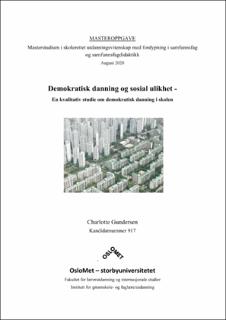| dc.contributor.advisor | Jøsok, Evy | |
| dc.contributor.advisor | Seland, Idunn | |
| dc.contributor.author | Gundersen, Charlotte | |
| dc.coverage.spatial | Norge | en_US |
| dc.date.accessioned | 2021-06-14T12:48:18Z | |
| dc.date.available | 2021-06-14T12:48:18Z | |
| dc.date.issued | 2020 | |
| dc.identifier.uri | https://hdl.handle.net/11250/2759344 | |
| dc.description.abstract | Skolens demokratiske oppdrag innebærer å utvikle handlekraftige aktører som både kan og vil ta del i demokratiet. På tross av at den ikke står alene i oppgaven om å danne demokratiske medborgere, så har skolen en viktig rolle i elevenes demokratiske danning. Samtidig viser forskning at det er en skjevfordeling i demokratisk deltakelse knyttet til sosioøkonomisk status. Dette legitimerer behovet for undersøkelser om skolens demokratiske danning i lys av sosial ulikhet, og skisserer opp bakgrunnen for denne studien. Denne oppgaven handler om demokratisk danning i skolen og sosial ulikhet, og undersøker hvordan demokratisk danning er forstått av elever og lærere i skoler som ligger i områder som er overrepresentert av enten høy eller lav sosioøkonomisk status? For å undersøke forståelsen av demokrati utførte jeg semi-strukturerte forskningsintervju med både lærere og elever ved fire ulike ungdomskoler. Skolene ble valgt ut basert på kriterier som muliggjorde undersøkelser av eventuelle variasjoner mellom skolene, basert på hvorvidt skolen rekrutterte elever fra områder hvor befolkningen har overveiende lav eller høy sosioøkonomisk status. Basert på analysen av datamaterialet har det vist seg tre hovedtendenser knyttet til problemstillingen. Det første funnet er at det er en forskjell i forståelse av demokratisk danning mellom HSØS og LØS; LSØS knytter det til oppdragelse og HSØS knytter det til danning. Det andre funnet viser at det er fokus på både kvalifiseringsformålet og sosialiseringsformålet med den demokratiske opplæringen, men det legges lite vekt på subjektiveringen. Det siste funnet et at det er lite bevissthet rundt hvordan sosial ulikhet som faktor spiller inn i den demokratiske danningen. Gjennom å undersøke demokratisk danning i lys av sosial ulikhet, ønsker jeg å belyse skolens mandat som demokratiskapende institusjon samtidig med dens rolle som utjevner av sosial reproduksjon. | en_US |
| dc.description.abstract | The school has a mission to develop agents who are able and eager to engage in a democratic society. Even though school is not the sole educator in the matter of fostering democratic participation, it does have a crucial role in the democratic education of the students. Research shows an unequal democratic participation due to socioeconomic status. This provides a basis for further research of the school’s democratic education when taking into consideration the social inequality in a classroom. The main objective of the thesis is to review how the democratic education is perceived by students and teachers in areas that are predominantly of either high or low socioeconomic status. To examine the understanding of democracy, I conducted semi-structured interviews with teachers and students at four different middle schools. The schools were selected based on the criteria which enabled studies of the possible variations between the schools, which recruited students from the intake areas where the population is of predominantly high or low socioeconomic status. Based on the analysis of the data provided, three main tendencies occurred related to the research question. The first finding shows that there is a difference in understanding democratic education between those with high and low socioeconomic status, where those with low socioeconomic status related it to upbringing, whereas those with high socioeconomic status perceive it as critical thinking. The second finding shows that the purpose of the democratic education mainly focuses to train and enable the students to participate in democratic processes through socialization, and less focus on development of the individual itself. The last finding shows that there is a lack of awareness of the social inequality as a factor may affect the democratic education. By reviewing democratic education in the light of social inequality, I wish to shine light on the school’s mandate to foster democratic participation as well as partaking to equalize social inequality and minimize social reproduction. | en_US |
| dc.language.iso | nob | en_US |
| dc.publisher | OsloMet - Storbyuniversitetet | en_US |
| dc.subject | Demokratisk danning | en_US |
| dc.subject | Sosiale ulikheter | en_US |
| dc.subject | Tilpassing | en_US |
| dc.subject | Demokratiforståelse | en_US |
| dc.subject | Demokratiopplæring | en_US |
| dc.subject | Opplæringsformål | en_US |
| dc.subject | Sosioøkonomiske statuser | en_US |
| dc.title | Demokratisk danning og sosial ulikhet – en kvalitativ studie om demokratisk danning i skolen | en_US |
| dc.title.alternative | Citizenship and social inequality – a qualitative research on democratic education in school | en_US |
| dc.type | Master thesis | en_US |
| dc.description.version | publishedVersion | en_US |
| dc.rights.holder | © Charlotte Gundersen | en_US |
| dc.source.pagenumber | 137 | en_US |
| dc.subject.nsi | VDP::Samfunnsvitenskap: 200::Pedagogiske fag: 280::Fagdidaktikk: 283 | en_US |
